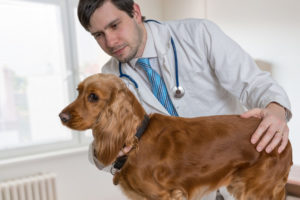
What is leptospirosis?
What is leptospirosis? It’s a zoonotic disease spread from animals to people, mainly from dogs, farm animals, and rodents. In most cases, this bacterium is unpleasant but not life-threatening. In honor of World Zoonoses Day on July 6, we’ll discuss leptospirosis in dogs in detail.
What are the Risks of Leptospirosis?
Leptospirosis commonly affects dogs. The common risk factors for leptospirosis in dogs living in the United States include exposure to or drinking from lakes, streams, or rivers; exposure to rural properties, farm animal species; and contact with other dogs or rodents.
Moreover, dogs can contract and develop the disease if their mucous membranes or any part of their skin with a wound come into contact with anything with infected urine, such as water, soil, food, or a bite from an infected animal. That means your four-legged friend can contract the disease from things as simple as puddles or even the dew on the grass if an infected animal has urinated in that area. Pups can also contract leptospirosis through their mother’s placenta.
What are the Signs of Leptospirosis in Dogs?
The signs of the disease differ in dogs. Some dogs don’t even demonstrate signs of illness, while others have severe illness or even death. In addition, the most common signs of leptospirosis include:
- Increased thirst
- Changes in the amount or frequency of their urination
- Vomiting
- Jaundice (yellow skin and mucous membranes)
- Fever
- Lethargy
- Muscle tenderness
Dogs might occasionally form severe respiratory diseases, bleeding disorders, and swollen legs.
How is Leptospirosis Diagnosed?
Because the signs of leptospirosis can vary so greatly, diagnosis can be difficult. Typically, we will start with a general examination followed by multiple diagnostic tests such as urine tests, blood tests, x-rays, and sometimes an ultrasound. These tests will help us rule out any other causes of your pet’s ailments. The way to definitively diagnose leptospirosis is to run a PCR test, which looks for the DNA of the organism in a blood and/or urine sample from your pet.
How is Leptospirosis Treated and Prevented in Dogs?
The ideal thing you can do for your pet when it comes to leptospirosis is to prevent it in the first place. Current vaccines effectively prevent and protect dogs from leptospirosis for at least 12 months. Minimizing your dog’s exposure to potential sources of the disease can also reduce its chances of infection.
If your dog does become infected with leptospirosis, early intervention is key. Leptospirosis is easily treatable with antibiotics and supportive care such as IV fluids when treatment starts early. The key is treating before serious organ damage is present.
Even though an infected dog demonstrates a low risk of infecting your or your family members, there is still a risk. So, perform the following precautions to protect yourself and your family if your dog has leptospirosis:
- Wash your hands after touching and handling your pet.
- Set up a designated area for your dog to urinate away from lingering water or high-traffic areas where people or other animals have access.
- Avoid any contact with your dog’s urine.
- Administer the prescribed antibiotics from your veterinarian.
- Quickly clean the affected area with household disinfectant and wear protective gloves if your dog urinates inside your home.
If you believe your dog might have leptospirosis, please call us today to schedule an appointment!
Here at Mount Carmel Animal Hospital, We’ll Treat Your Pets Like Family!
Mount Carmel Animal Hospital has been serving the Northern Baltimore/Southern York community for over 30 years and is proud to be an independently operated, small animal practice committed to excellence in veterinary medicine and client service. From grooming to wellness services, along with Canine Life Skills Training Courses, and surgical procedures, we have the expertise that will best serve the needs of you and your pet. Contact us at 410-343-0200 and follow us on Facebook!
